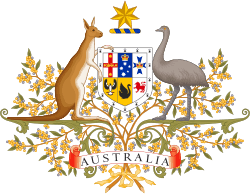R v Burgess; Ex parte Henry
| R v Burgess; Ex parte Henry | |
|---|---|
 | |
| Court | High Court of Australia |
| Full case name | The King v Burgess; Ex parte Henry |
| Decided | 10 November 1936 |
| Citation(s) | (1936) 55 CLR 608 |
| Case history | |
| Prior action(s) | none |
| Subsequent action(s) | none |
| Case opinions | |
|
(5:0) The Commonwealth government's power to regulate interstate trade and commerce does not extend to intrastate trade and commerce (per Latham CJ, Starke, Dixon, Evatt & McTiernan JJ) (3:2) The implementation of an international treaty is valid where the treaty is bona fide and the subject matter is of international concern (per Latham CJ, Evatt & McTiernan JJ; Starke & Dixon JJ dissenting) | |
| Court membership | |
| Judge(s) sitting | Latham CJ, Starke, Dixon, Evatt & McTiernan JJ |
R v Burgess; Ex parte Henry (1936) 55 CLR 608 was a case decided in the High Court of Australia regarding the scope of the trade and commerce power and the external affairs power, in sections 51(i) and 51(xxix) respectively, of the Constitution.
Background
Henry Goya Henry was an aviator who had his aviation licence suspended. Two days after the suspension he nevertheless flew a plane, setting off from Mascot airport and then flying around, over and under the Sydney Harbour Bridge. He was convicted of breaching regulation 6 of the federal Air Navigation Regulations which prohibited an unlicensed person from flying an aircraft "within the limits of the Commonwealth". The regulations were made pursuant to section 4 of the Aircraft Navigation Act 1920, which authorised the Governor-General to make regulations to give effect to the Convention for the Regulation of Aerial Navigation. He challenged the constitutional validity of the regulation.
Decision
External affairs
The Constitution gave no express power to the Commonwealth to regulate aviation, a subject that did not exist when the Constitution was drafted at the end of the 19th century. The Commonwealth argued that its rules were made in pursuance of an international convention and were, therefore, laws with respect to external affairs.
The majority (Latham CJ, Evatt & Mctiernan JJ) took a broad view of the external affairs power, and accepted that the Commonwealth could enact legislation pursuant to a bona fide international treaty. Latham CJ dismissed arguments attempting to exclude the external affairs power from encompassing certain domestic subjects. Evatt and McTiernan JJ concluded that once a treaty was signed and entered into, the provisions contained therein were brought under the external affairs power by virtue of their inclusion in the treaty.
The minority (Starke & Dixon JJ) took a narrower approach, with Starke J arguing that the treaty had to be 'of sufficient international significance to make it a legitimate subject for international co-operation and agreement'. Dixon J considered that the power of the Commonwealth to implement treaties through legislation was necessarily limited by the federal nature of the Constitution, so the subject matter of the treaty upon which it was based had to be 'indisputably international in character'.
Even under the broad view of the external affairs power, the Court invalidated the regulations on the grounds that they did not carry out and give effect to the conventions of the treaty.
Trade and commerce
The only other power that seemed available was 'trade and commerce with other countries and among the States'. Mr Henry however, had not been flying from or to any other state or country. The Commonwealth argued that the commingling in air routes and airports of aircraft proceeding intrastate with those travelling interstate, enabled it to control all aircraft. The Court rejected the commingling argument, preferring to maintain a distinction between interstate and intrastate trade. Mr Henry could not be prevented by the Commonwealth from stunt-flying around Sydney Harbour under the commerce power. The Constitution clearly distinguished between intrastate and interstate commerce, and confined the Commonwealth to the latter.
Result
The Commonwealth held a referendum in 1937 to have the Constitution amended to give it express power over aviation. Although the measure received 53.56% of the 'yes' vote nationwide, it did not gain a majority support in a majority of states, with only Victoria and Queensland supporting the measure.
See also
- Section 51(i) of the Australian Constitution
- Section 51(xxix) of the Australian Constitution
- Australian constitutional law
References
- Winterton, G. et al. Australian federal constitutional law: commentary and materials, 1999. LBC Information Services, Sydney.